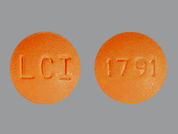Fluphenazine Hcl
Fluphenazine Hcl
What is Fluphenazine Hcl used for?
This medication is used to treat certain mental/mood disorders (such as schizophrenia). Fluphenazine belongs to a class of drugs known as antipsychotics. It works by helping to restore the balance of certain natural substances in the brain. This medication is not recommended for use in children under 12 years of age.
CHEMICAL NAME
DRUG TYPE
Mental DiseasesFluphenazine Hcl Prices
Searching for the lowest prices
What does Fluphenazine Hcl look like?
View all Fluphenazine Hcl Image Information (18)Fluphenazine Hcl Frequently Asked Questions
Drowsiness, lethargy, dizziness, lightheadedness, nausea, loss of appetite, sweating, dry mouth, blurred vision, headache, and constipation may occur. If any of these effects last or get worse, notify your doctor or pharmacist promptly.
Dizziness and lightheadedness can increase the risk of falling. Get up slowly when rising from a sitting or lying position.
Tell your doctor right away if any of these side effects occur: muscle spasm/stiffness, shaking (tremor), restlessness, mask-like expression of the face, drooling/trouble swallowing, or shuffling walk. Your doctor may prescribe another medication to decrease these side effects.
Remember that this medication has been prescribed because your doctor has judged that the benefit to you is greater than the risk of side effects. Many people using this medication do not have serious side effects.
Tell your doctor right away if you have any serious side effects, including: unusual mental/mood changes (such as depression, confusion, worsening of psychosis), unusual dreams, frequent urination or difficulty urinating, vision problems, weight change, swelling of the feet/ankles, fainting, skin discoloration, butterfly-shaped facial rash, joint pain, seizures.
In rare instances, this medication may increase your level of a certain hormone (prolactin). For females, this rare increase in prolactin may result in unwanted breast milk, missing/stopped menstrual periods, or difficulty becoming pregnant. For males, it may result in decreased sexual ability, inability to produce sperm, or enlarged breasts. If you develop any of these symptoms, tell your doctor right away.
Rarely, males may have a painful or prolonged erection lasting 4 or more hours. If this occurs, stop using this drug and get medical help right away, or permanent problems could occur.
Fluphenazine may rarely cause a condition known as tardive dyskinesia. In some cases, this condition may be permanent. Tell your doctor right away if you develop any unusual/uncontrolled movements (especially of the face, mouth, tongue, arms, or legs).
This medication may rarely cause a very serious condition called neuroleptic malignant syndrome (NMS). Get medical help right away if you have any of the following symptoms: fever, muscle stiffness/pain/tenderness/weakness, severe tiredness, severe confusion, sweating, fast/irregular heartbeat, dark urine, signs of kidney problems (such as change in the amount of urine).
This drug may rarely cause serious blood problems (such as agranulocytosis, leukopenia) or liver problems. Get medical help right away if you notice any of the following rare but very serious side effects: signs of infection (such as sore throat that doesn't go away, fever, chills), easy bruising/bleeding, severe stomach/abdominal pain, yellowing of the eyes/skin.
A very serious allergic reaction to this drug is rare. However, get medical help right away if you notice any symptoms of a serious allergic reaction, including: rash, itching/swelling (especially of the face/tongue/throat), severe dizziness, trouble breathing.
This is not a complete list of possible side effects. If you notice other effects not listed above, contact your doctor or pharmacist.
In the US -
Call your doctor for medical advice about side effects. You may report side effects to FDA at 1-800-FDA-1088 or at www.fda.gov/safety/medwatch-fda-safety-information-and-adverse-event-reporting-program.
In Canada - Call your doctor for medical advice about side effects. You may report side effects to Health Canada at 1-866-234-2345.
IMPORTANT: HOW TO USE THIS INFORMATION: This is a summary and does NOT have all possible information about this product. This information does not assure that this product is safe, effective, or appropriate for you. This information is not individual medical advice and does not substitute for the advice of your health care professional. Always ask your health care professional for complete information about this product and your specific health needs.



